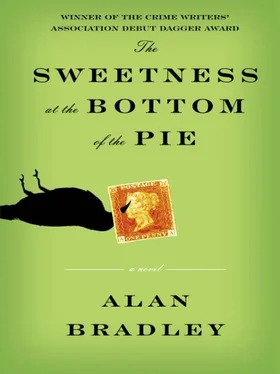Alan Bradley - The Sweetness at the Bottom of the Pie
Здесь есть возможность читать онлайн «Alan Bradley - The Sweetness at the Bottom of the Pie» весь текст электронной книги совершенно бесплатно (целиком полную версию без сокращений). В некоторых случаях можно слушать аудио, скачать через торрент в формате fb2 и присутствует краткое содержание. Жанр: Старинная литература, на английском языке. Описание произведения, (предисловие) а так же отзывы посетителей доступны на портале библиотеки ЛибКат.
- Название:The Sweetness at the Bottom of the Pie
- Автор:
- Жанр:
- Год:неизвестен
- ISBN:нет данных
- Рейтинг книги:3 / 5. Голосов: 1
-
Избранное:Добавить в избранное
- Отзывы:
-
Ваша оценка:
- 60
- 1
- 2
- 3
- 4
- 5
The Sweetness at the Bottom of the Pie: краткое содержание, описание и аннотация
Предлагаем к чтению аннотацию, описание, краткое содержание или предисловие (зависит от того, что написал сам автор книги «The Sweetness at the Bottom of the Pie»). Если вы не нашли необходимую информацию о книге — напишите в комментариях, мы постараемся отыскать её.
The Sweetness at the Bottom of the Pie — читать онлайн бесплатно полную книгу (весь текст) целиком
Ниже представлен текст книги, разбитый по страницам. Система сохранения места последней прочитанной страницы, позволяет с удобством читать онлайн бесплатно книгу «The Sweetness at the Bottom of the Pie», без необходимости каждый раз заново искать на чём Вы остановились. Поставьте закладку, и сможете в любой момент перейти на страницу, на которой закончили чтение.
Интервал:
Закладка:
"And how are you, my little pelican?" Max asked, canting his head like a magpie awaiting a crumb of response even before it was offered.
"I'm all right," I said warily, remembering that Daffy had once told me that Max was like one of those spiders that paralyzed you with a bite, and didn't quit until he had sucked the last drop of juice from your life—and from the life of your family.
"And your father, the good Colonel?"
"He's keeping busy, what with one thing and another," I said. I felt my heart give a flip-flop in my breast.
"That Miss Ophelia, now," he asked. "Is she still painting her face like Jezebel and admiring herself in the tea service?"
This was too close to home, even for me. It was none of his business, but I knew that Maximilian could fly into a towering rage at the drop of a hat. Feely sometimes referred to him behind his back as “Rumpelstiltskin,” and Daffy as “Alexander Pope—or lower.”
Still, I had found Maximilian, in spite of his repellent habits, and perhaps because of our similarity in stature, occasionally to be an interesting and informative conversationalist—just so long as you didn't mistake his diminutive size for weakness.
"She's very well, thank you," I said. "Her complexion was quite lovely this morning."
I did not add “maddeningly.”
"Max," I asked, before he could wedge in another question, "do you think I could ever learn to play that little toccata by Paradisi?"
"No," he said, without an instant's hesitation. "Your hands are not the hands of a great artist. They are the hands of a poisoner."
I grinned. This was our little joke. And it was obvious that he had not yet learned of the murder at Buckshaw.
"And the other one?" he asked. "Daphne. the slow sister?"
"Slow" was a reference to Daffy's prowess, or lack of it, at the piano: an endless, painful quest to place unwilling fingers upon keys that seemed to shy away from her touch. Daffy's battle with the instrument was one of the hen pitted against the fox, a losing battle that always ended in tears. And yet, because Father insisted upon it, the war went on.
One day when I found her sobbing on the bench with her head on the closed piano lid, I had whispered, “Give it up, Daff,” and she had flown at me like a fighting cock.
I had even tried encouragement. Whenever I heard her at the Broadwood, I would drift into the drawing room, lean against the piano, and gaze off into the distance as if her playing had enchanted me. Usually she ignored me, but once when I said, “What a lovely piece that is! What's it called?” she had almost slammed the lid on my fingers.
"The scale of G major!" she had shrieked, and fled the room.
Buckshaw was not an easy place in which to live.
"She's well," I said. "Reading Dickens like billy-ho. Can't get a word out of her."
"Ah," Maximilian said. "Dear old Dickens."
He didn't seem to be able to think of anything further on that topic, and I dived into the momentary silence.
"Max," I said. "You're a man of the world—"
At this he preened himself, and puffed up to whatever little height he could muster.
"Not just a man of the world—a boulevardier," he said.
"Exactly," I said, wondering what the word meant. "Have you ever visited Stavanger?" It would save me looking it up in the atlas.
"What? Stavanger in Norway?"
"SNAP!" I almost shouted aloud. Horace Bonepenny had been in Norway! I took a deep breath to recover myself, hoping it would be mistaken for impatience.
"Of course in Norway," I said condescendingly. "Are there other Stavangers?"
For a moment I thought he was onto me. His eyes narrowed and I felt a chill as the thunderclouds of a Maximilian tantrum blew across the sun. But then he gave a tiny giggle, like springwater gurgling into a glass.
"Stavanger is the first stepping-stone on the Road to Hell. which is a railway station," he said. "I traveled over it to Trondheim, and then on to Hell, which, believe it or not, is a very small village in Norway, from which tourists often dispatch picture postcards to their friends with the message, 'Wish you were here!' and where I performed Grieg's Piano Concerto in A Minor. Grieg, incidentally, was as much a Scot as a Norwegian. Grandfather from Aberdeen, left in disgust after Culloden—must have had second thoughts, though, when he realized he'd done no more than trade the firths for the fjords.
"Trondheim was a great success, I must say. critics kind, public polite. But those people, they never understand their own music, you know. Played Scarlatti as well, to bring a glimpse of Italian sunshine to those snowy northern climes. Still, at the intermission I happened to hear a commercial traveler from Dublin whispering to a friend, ‘It's all Grieg to me, Thor.’”
I smiled dutifully, although I had heard this ancient jest about forty-five times before.
"That was in the old days, of course, before the war. Stavanger! Yes, of course I've been there. But why do you ask?"
"How did you get there? By ship?"
Horace Bonepenny had been alive in Stavanger and now he was dead in England and I wanted to know where he had been in between.
"Of course by ship. You're not thinking of running away from home, are you, Flavia?"
"We were having a discussion—actually a row—about it last night at supper."
This was one of the ways to optimize a lie: shovel on the old frankness.
"Ophelia thought one would embark from London; Father insisted it was Hull; Daphne voted for Scarborough, but only because Anne Bronte is buried there."
"Newcastle-upon-Tyne," Maximilian said. "Actually, it's Newcastle-upon-Tyne."
There was a rumble in the distance as the Cottesmore bus approached, waddling along the lane between the hedgerows like a chicken walking a tightrope. It stopped in front of the bench, wheezing heavily as it subsided from the effort of its hard life among the hills. The door swung open with an iron groan.
"Ernie, mon vieux ,” Maximilian said. “How fares the transportation industry?”
"Board," Ernie said, looking straight ahead through the windscreen. If he caught the joke he chose to ignore it.
"No ride today, Ernie. Just using your bench to rest my kidneys."
"Benches are for the sole use of travelers awaiting a coach. It's in the rule book, Max. You know that as well as I do."
"Indeed I do, Ernie. Thank you for reminding me."
Max slid off the bench and dropped to the ground.
"Cheerio, then," he said, and tipping his hat, he set off along the road like Charlie Chaplin.
The door of the bus squealed shut as Ernie engaged the juddering gears and the coach whined into reluctant forward motion. And so we all went our separate ways: Ernie and his bus to Cottesmore, Max to his cottage, Gladys and I resuming our ride to Hinley.
THE POLICE STATION IN HINLEY was housed in a building that had once been a coaching inn. Uncomfortably hemmed in between a small park and a cinema, its half-timbered front jutted beetle-brow out over the street, the blue lamp suspended from its overhang. A cinder-block addition, painted a nondescript brown, adhered to the side of the building like cow muck to a passing railway carriage. This, I suspected, was where the cells were located.
Leaving Gladys to graze in a bicycle stand that was more than half full of official-looking black Raleighs, I went up the worn steps and in the front door.
A uniformed sergeant sat at a desk shuffling bits of paper and scratching his sparse hair with the sharpened end of a pencil. I smiled and walked on past.
"'Old on, 'old on," he rumbled. "Where do you think you're goin', miss?" he asked.
It seems to be a trait of policemen to speak in questions. I smiled as if I hadn't understood and moved towards an open door, beyond which I could see a dark passageway. More quickly than I would have believed, the sergeant was on his feet and had seized me by the arm. I was nabbed. There was nothing else to do but burst into tears.
Читать дальшеИнтервал:
Закладка:
Похожие книги на «The Sweetness at the Bottom of the Pie»
Представляем Вашему вниманию похожие книги на «The Sweetness at the Bottom of the Pie» списком для выбора. Мы отобрали схожую по названию и смыслу литературу в надежде предоставить читателям больше вариантов отыскать новые, интересные, ещё непрочитанные произведения.
Обсуждение, отзывы о книге «The Sweetness at the Bottom of the Pie» и просто собственные мнения читателей. Оставьте ваши комментарии, напишите, что Вы думаете о произведении, его смысле или главных героях. Укажите что конкретно понравилось, а что нет, и почему Вы так считаете.












